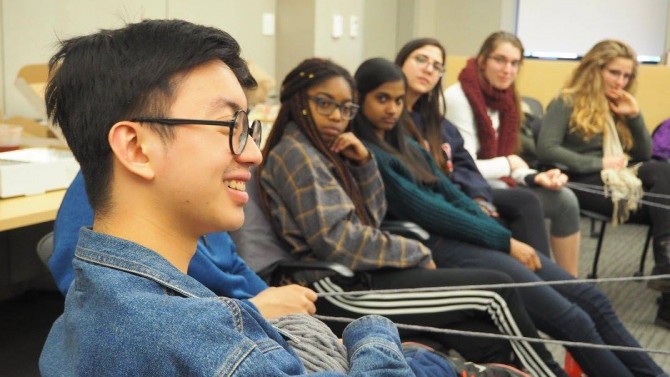Intergroup Dialogue Project broadens students’ worlds
By Jennifer Savran Kelly
Alicia O’Neil ’18 has always felt confident as a young black woman. But when she arrived at Cornell she realized she didn’t fully understand what her social identities meant in relation to other people and the larger context of the world.
“When it came to hot topics about race, I didn’t know how to assert my ideas and still come across as respectful,” said O’Neil. Her experience with Cornell’s Intergroup Dialogue Project (IDP) provided her with key opportunities to connect authentically with people across cultures and identities – and not only those who are comfortable doing so.
Since the program was established at Cornell and the undergraduate course was adopted by the College of Agriculture and Life Sciences (CALS) in 2012, IDP has become one of the main programs on campus to offer peer-facilitated courses and workshops that teach communication and collaboration across social, cultural and power differences to promote equity and democracy.
For the first time this fall, all 3,325 incoming first-year students to Cornell will take part in three-hour IDP sessions during orientation. Because small group size is essential to the IDP model, first-year students will be divided into almost 200 groups, and alumni of the program will return to facilitate.
The program uses a structured process that operates on the premises that empathy can be learned and that students can practice creating a community in which people feel they can bring their full selves, without fear that they must change to be part of it.
Peer-facilitator Sarah Aiken ’18 grew up in a predominantly white environment and came to Cornell with a strong desire to engage in conversations about cultural difference, but she didn’t feel she had the skills or outlet to do so. It was while studying special education as a sophomore that she felt encouraged by a semesterlong IDP course to expand her focus beyond disability to other identities.
“Before that, I sought out people like myself, like a lot of people do,” said Aiken. “In conversations about race, I would often take a step back out of fear of saying the wrong thing. I recognized I would be doing a disservice to my future students if I didn’t learn to focus on other identities.”
Developed in the 1980s at University of Michigan, intergroup dialogue has undergone rigorous research and multiple revisions. At Cornell it is primarily taught as an academic course for undergraduates, and in CALS it fulfills the mandatory diversity requirement established by the college.
“Research shows that IDP works,” says IDP director Adi Grabiner-Keinan. “We want to expose students to the structure early on, but just as important, we want to send a clear message about our values as a university and create a shared language. To affect real change, we need to work on altering discourse and assumptions and teach people how to talk with each other.”
The program started with two sections and has expanded to 13 per semester, with 200 students participating and more than 200 on the waiting list. IDP has grown to include offerings for faculty, staff, graduate students, postdoctoral scholars and alumni.
In the undergraduate course, in small sections of 14 to 18 participants, everyone considers questions relating to identity, power and difference in American society. But each section focuses on one specific identity, such as gender, sexual orientation, socio-economic status, race or disability. Sections are designed for balanced participation within the identity of focus and are led by two peer-facilitators. For example, a class that focuses on race will comprise equal numbers of white students and students of color, with one facilitator of color and one white facilitator.
Peer facilitators have not only taken the course but also receive training before and during their semester of teaching to guide difficult conversations. The issues raised are very personal and salient, O’Neil said, and many students find it challenging to make themselves vulnerable.
“In conversations about social justice, it’s easy to talk about the ways in which we’re oppressed,” she said. “As a black woman, the experience at IDP helped me learn how to confront my socio-economic privilege and my privilege as a U.S. citizen. I wanted to know how to encourage other people to do the same, because it’s really hard.”
For Calvin Schuster ’19, a biological sciences major and creative writing minor, facilitating IDP courses has given him the opportunity to engage with people who are passionate about mining topics of social identity.
“Even though it didn’t fulfill any of my course requirements, there was no way I could stop being involved,” he said. “It was so important for me to able to talk with people who are passionate about these issues and genuinely interested in growing their perspectives.”
Experiential learning is a crucial component of the program. Participants reflect on their personal experiences while learning how they might be related to broader social and cultural structures, and everyone chooses a research topic related to their identity and to campus life. Projects for the spring 2018 semester included representation in mental health staff at Cornell, resource allocation for women’s and men’s sports teams, food insecurity on campus, gender-inclusive housing and advising international students.
“Colleges and universities are amazing spaces to do this work, especially Cornell, which values compositional diversity among its core principles,” Grabiner-Keinan said. “CALS is an extremely diverse college and was the first on campus to make diversity coursework mandatory, which was an important move because it ensures a variety of perspectives are represented in the classroom. This is crucial for learning about oneself and for engaging empathetically in a way that invites diverse perspectives in an effort to create shared meaning.”
Jennifer Savran Kelly is a writer for the College of Agriculture and Life Sciences.
Media Contact
Get Cornell news delivered right to your inbox.
Subscribe

